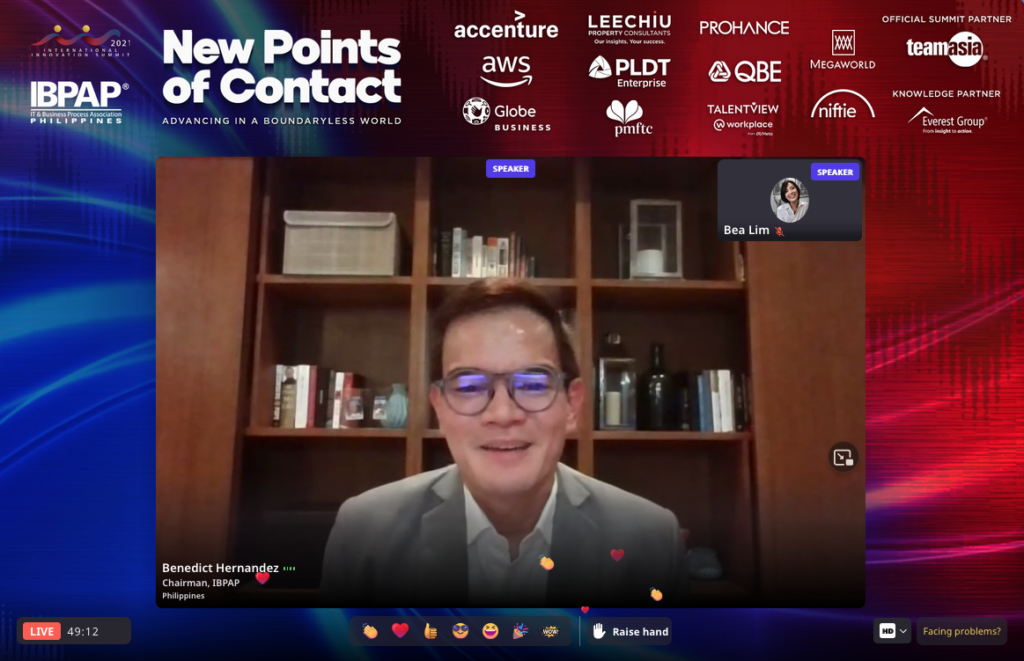Navigating the New Normal: IBPAP focuses on IT-BPM resurgence at the IIS 2021
by Madge Resurreccion / December 13, 2021
While the pandemic presented challenges in every aspect of living in the country, the Information Technology and Business Process Management (IT-BPM) industry in the Philippines continues to strive and establish itself as one of the pillars of the Philippine economy. The sector did not let the new normal become a stumbling block and instead, they took it as a chance to explore new ways and ideas to maximize opportunities.

The state of the industry, its plans, and a lot more were discussed in the 13th International Innovation Summit (IIS) recently held by the IT and Business Process Association of the Philippines (IBPAP). Themed, “New Points of Contact: Advancing in a Boundaryless World,” the five-day event took delegates on a deep dive into the Platforms, People, Pillars, Policies, and Places of Contact that are essential to sustaining the IT-BPM industry in the country.

IBPAP Chairman Benedict C. Hernandez emphasized that the sector remains one of the Philippines’ economic pillars. Agile and resilient, the industry navigated through major headwinds to drive recovery in 2020 with 1.32 million full-time employees and $26.7 billion in revenue.
Citing a study by the Everest Group, Hernandez shared that amid the lingering impact of the pandemic, 2021 marks a resurgence for the country’s IT-BPM sector—preserving jobs, generating new opportunities, stimulating countryside development, and creating demand for real estate.
According to the report, Philippine IT-BPM is expected to increase between 7-8% in terms of FTEs and 8-12% in terms of revenue. This is similarly reflected in a survey conducted by IBPAP showing that 56% of companies are seeing a double-digit growth by year-end while 38% are predicting single-digit growth. Another 6% remarked that they are forecasting flat growth in 2021.

To ensure that the industry is supported and strengthened well beyond 2021, new points of contact were identified at IIS 2021. Newly appointed President and CEO of IBPAP Jack Madrid believes each one will be crucial in shaping the future of the Philippine IT-BPM sector — technology to fuel the future of work, upskilling and reskilling the IT-BPM workforce, amplify partnerships to ensure a national multiplier effect, formulation of responsive public policies, and reinvigorating the country’s narrative of agility and resilience to attract more investors and locators.
Madrid noted that discussions on these new points of contact tell us that in this disruptive world, a change of mindset is essential; accelerating digitization should be viewed as maximizing rather than replacing current workforce, workplaces, and workways. The future of work is here and will require an adaptable workforce that’s steeped in lifelong learning, and a new breed of leaders to pave the way.
As the year-end approaches, IBPAP is preparing for the development of the much-anticipated IT-BPM Roadmap 2028 that will be the blueprint for defining the sector’s key priorities in digitization, talent, policy shaping, infrastructure, and country branding in the next six years.
“We aim to complete this by the middle of 2022,” Madrid announced. “We will take the learnings from this Summit for our Roadmap, one of which is to be prepared for more disruption. As such, the Roadmap will allow real-time and mid-point reviews along the six years to calibrate for any changes to keep us on track and address any speed bumps along the way.”

With the industry’s growth expected to continue, Madrid assured the stakeholders that IBPAP will persevere in advocating for the Philippines on the global stage, “Contrary to what some people believe, the IT-BPM industry is not at its sunset. Far from it. This is evidenced by our extraordinary performance and growth despite the past 20 months of unprecedented change—a shared triumph that we can all be proud of. For those of you who are still planning to expand your business here, there is no better time than now.”
The IT-BPM industry is expected to continue its growth in the coming years. While efforts are being prepared to undertake this next step, the members of the workforce continue to lobby against the ‘no-vax-no-work’ policy. Meanwhile, the government continues to focus on vaccination efforts for younger Filipinos. Vaccine czar Carlito Galvez Jr. reported that around 6.5 million minors aged 12 to 17 years old have already been vaccinated against COVID-19.
The future looking bright for the country brings good news not only to the Philippine economy but also to a number of industries that have been badly affected by the pandemic. For the IT-BPM sector, this will open new opportunities and reignite hope that 2022 may be a better year for the country.
Read also:
- IBM to teach, train 30 million people with digital skills by 2030
- The Big Move: Rey Untal joins PH-owned Pointwest
- IBPAP fronts imperatives amid lowered 2022 IT-BPM targets

Image source: @sigmund | unsplash.com


